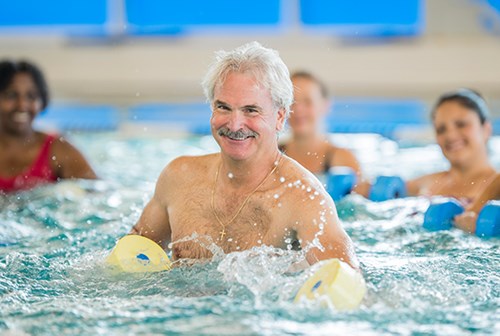Resistance Training in Water May Improve Bone Strength
Water Exercise for Older Adults Is Beneficial for Bones, Muscles, and Overall Health
For aging adults, bone loss is a significant health concern. We start to lose muscles used for powerful and quick movements that stimulate bone health as we age. Exercises associated with positive bone maintenance and growth are typically land-based, where weight-bearing and high-impact activities are proven to improve bone density.

The problem is those types of exercises aren’t always the best choice for older adults with chronic disorders, injuries, or physical limitations. That’s where water-based exercise like water aerobics reigns supreme. Even if water exercise is low impact, it’s not necessarily less effective in preventing age-related bone deterioration. Here are several reasons why water exercise is good for your bones and how it may decrease the rate of bone loss.
If someone has osteoporosis, for example, resistance training and mechanical loading are necessary. But not everyone can do land exercises, so water is a great place to exercise because it provides resistance with every movement. Muscles become strengthened with consistent water exercise. When you move your body in the pool, the low-impact resistance activates your muscles to help make them more flexible and mobile.
When you push against water, it pushes back. By using maximum effort in your strength training exercises in water without shortening the range of motion, bone mineral density is typically at least maintained if not improved, according to a study on postmenopausal women.
High-Intensity Interval Training (HIIT) in Water
In the HIIT format, aquatic workouts target major muscle groups. These types of water aerobics classes or workouts are for adults who are healthy and fit for the most part because you are getting your heart rate up in bursts of exertion and then resting to catch your breath (recovery).
Maximum effort exercises that encourage jumping in water may help maintain bone density and prevent yearly decline. HIIT in the pool is rigorous enough for athletes and older adults who have no permanent physical limitations. Leg strength and agility are likely to increase over time, not to mention your cardio, but the key is consistency.
Pool Exercise May Help Reduce Falls
In addition to improved cardiovascular fitness, muscle strength, flexibility, and bone density maintenance, water exercise may help reduce the number of falls and improve balance. The study on postmenopausal women in their 50s-60s mentioned above showed a significant decrease in falls among the aquatic exerciser group. The women in the six-month study were also taking vitamin D and calcium supplements, vitamins known to help build muscle and bone. With better balance, you are less likely to fall as well.
Water exercise has numerous health benefits, especially when you get in the pool with the intention of firing up your muscles and getting a great workout. Low-impact doesn’t mean low effort!
About Ability Fix
Ability Fix is an award-winning mobile app that provides an accessible way to get fit with exercises for water aerobics, regardless of your current physical ability level. Using any body of water, participants are guided through easy-to-understand aquatic exercises that may incrementally improve balance, flexibility, strength, and cardio with less pain. App users can customize their own routine or select a predefined workout with any device, including smartphones, laptops, tablets, smart TVs, and Bluetooth headphones. The Ability Fix aquatics fitness app officially launched at the beginning of 2020 with 50 exercises and three Ai Chi routines. The forgiving water environment is fun, effective, and you can make your aquatic exercise routine as challenging as you’d like.
Learn more about Ability Fix at www.abilityfix.com